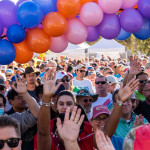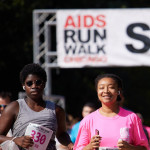 We hit the emergency room at 8 o’clock on a Sunday morning. I had been struggling to catch my breath since the night before. Chest x-rays showed collapsed lungs and strange markings that could have been either pneumocystis carinii pneumonia or tuberculosis. A rapid HIV test came back positive. It was like a car crash.
We hit the emergency room at 8 o’clock on a Sunday morning. I had been struggling to catch my breath since the night before. Chest x-rays showed collapsed lungs and strange markings that could have been either pneumocystis carinii pneumonia or tuberculosis. A rapid HIV test came back positive. It was like a car crash.
Jeff had to take on the world outside the emergency room: calling my family, my work, his family, his work. Just as the ground began to slip away from under him, he called his good friend Chip Lewis, who works at Whitman-Walker. Chip pulled Jeff together and so Jeff could hold everything else together.
A few days later, and we’re still at the hospital. A doctor drops a full set of test results onto my hospital bed without explanation. At the time it was so unbelievable… but I now think it was because there is an assumption that gay men know all about HIV/AIDS. I think there is an assumption that we remain the most educated population. Speaking for Jeff and me, we aren’t… or rather we weren’t then. What we knew was 1985 AIDS. Those test results with CD4 counts and viral load numbers only meant bad news.
Chip got us in touch with Justin Goforth, director of medical adherence at Whitman-Walker. Justin took Jeff’s call on a random Tuesday afternoon, and spent over an hour on the phone. Jeff sat next to my bed, reading each test result line, and Justin slowly explained what each number meant: serious implications but never hopeless. Thirty-six hours later, Justin came to see us at the hospital. He answered all of our questions and mapped out what the road to recovery would look like.
After 30 days in the hospital, I was able to go home. My recuperation was moving steadily but slowly. I wasn’t released back to work. The ripples of what had happened started to widen. I reached out to Whitman-Walker Legal Services to get some guidance on navigating my job and my future. Jessica Caspe, senior staff attorney, took me through all the steps of what I would need to know and do as my health improved and I could re-enter the workforce.
It was around then that I looked for help facing the emotional implications of all this. In searching out a counselor, I found Lance Morgan, Max Robinson Center day treatment program director. At the time, his connection to Whitman-Walker seemed just a coincidence. After we started working together, it became obvious to me that I could not have been luckier to have him. Lance’s years of experience uniquely equipped him to help me get back on my feet.
On January 10, 2010, I had 62 t-cells, advanced PCP, collapsed lungs, and a viral load over three million. My partner and I faced what looked like the end of the road—but step by careful step these good people from Whitman-Walker helped us walk away from that car crash and back to our lives.
Watch them tell their story:
Originally published at whitman-walker.org.






Comments
Comments